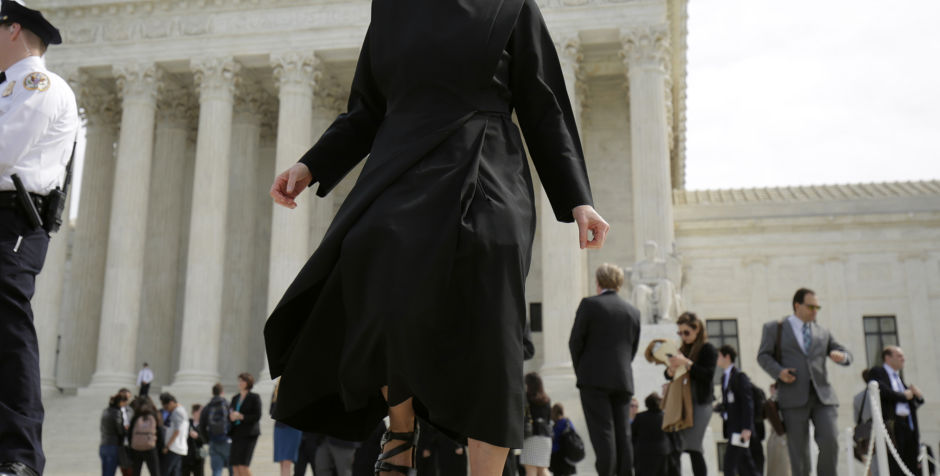Supreme Court Divided over Little Sisters of the Poor
Today the U.S. Supreme Court heard oral argument over the religious freedom rights of the Little Sisters of the Poor and other religiously affiliated institutions (including dioceses and universities).
In the case of Zubik v. Burwell, the Obama Administration defended its efforts to co-opt, or "hijack," as at least two Justices described it, the health insurance plans of the Sisters and their fellow litigants to provide birth control and abortifacient drugs and devices to which the Sisters and the other challengers object on religious grounds. The ACLJ has filed an amicus brief supporting the Sisters. The full transcript of the oral argument is available here.
The Obama Administration regards birth control as basic "preventive care" -- i.e., deeming as "disease" or "unhealthy" a woman's fertility and childbearing. (In a Freudian slip during the argument, the federal government's attorney referred to a "medical condition that puts me at risk of being pregnant." That's called "fertility". Presumably he meant to refer to a medical condition that puts someone at risk if they become pregnant.)
Obama's Department of Health and Human Services (HHS) therefore has chosen to implement the Patient Protection and Affordable Care Act (PPACA, popularly called ObamaCare) by requiring most insurance plans to cover all approved forms of birth control, including those that may cause early abortions. The HHS rules have plenty of exceptions – preexisting plans are exempt under a "grandfather" clause; small businesses are not required to offer insurance at all; and churches are completely exempt. But for whatever reason, religious orders like the Sisters, religious colleges and universities, pro-life ministries like Priests for Life, and other entities are not exempt, despite their religious objections to facilitating activities they regard as immoral. (Some of these challengers, like the Catholic entities, object both to contraceptives and abortifacients; others object only to the abortifacients.) Instead, the HHS mandate requires these entities to file a notice of objection that triggers the very same birth control coverage to which these entities object. The Obama Administration calls this an "accommodation," while the objectors call it "complicity" in sin.
During the oral argument, the four liberal Justices – Ginsburg, Breyer, Sotomayor, and Kagan – vigorously challenged the Sisters' position. Some took the position that the federal government could not function if the conscience rights of objectors were given legal force. Others suggested that since we all have to pay taxes, despite our objection to some uses of that tax money, then the Sisters should have to go along with having their insurance plans used for objectionable services. (If all four of these Justices side with the Obama Administration, and if the four conservative-leaning Justices side with the objectors, the resulting tie-vote would mean the case would either be held over to next year or else "affirmed by an equally divided court," in which case the Sisters would lose but there would be no national precedent set.)
Curiously, the Obama Administration's main attorney, Solicitor General Donald Verrilli, admitted that the federal government's interest was not just in providing free birth control to everyone, but specifically in having everyone get that coverage on their "regular plan," from their "regular doctor." Having a separate free coverage plan was just not good enough. Verrilli refused to concede that there was a "substantial burden" on the religious beliefs of objectors who felt they were being forced to collaborate with sinful (and in the case of abortion, homicidal) acts under threat of millions of dollars in penalties.
Importantly, nothing in the oral arguments sought to distinguish birth control from any other potentially objectionable "health" practice, such as abortion, sex-change surgery, or euthanasia. It seems clear that if the Sisters lose in this case, they – and everyone else – could also be required to have insurance plans that, either directly or by the government's two-step process here, cover abortions. (The two-step process is (1) the covered entity objects to the coverage, and then (2) that objection prompts the government to order the same insurer to provide the same objectionable coverage, supposedly at "no charge" to the objector.)
Near the end of the argument, Justice Sotomayor asked if there was any difference between having birth control coverage provided through a separate, birth-control only plan provided through a public insurance exchange, on the one hand, and having birth control coverage provided through a separate, birth-control only rider provided on top of the employer's insurance plan. "It's basically the same thing, isn't it?" she asked. Verrilli insisted that having a separate plan on a public exchange was different and unacceptable.
But Justice Sotomayor may be right on this: If the government can provide universal free birth control through a separate, publicly available free insurance policy instead of a separate, piggybacking “free” insurance rider, should not the religious freedom rights of the objectors mean at least that the government should choose the less objectionable alternative, the one that does not "hijack" the objector's policy or require objectors to trigger the objectionable coverage? Does not religious freedom at least mean that much respect for conscientious objection?
The Court is expected to issue its decision by the end of the term in June. So we will see, and we will continue to fight for the religious liberty rights of nuns serving the poor and all other religious organizations.
